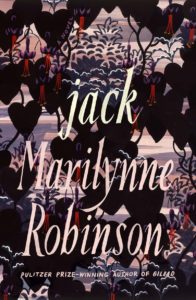Bob Moyer, an avid reader, often goes through books at a rapid pace. But those tend to be mysteries. This novel, he says, forced him to slow down.
Reviewed by Robert P. Moyer
JACK. By Marilynne Robinson. Farrah Straus Giroux. 309 pages. $27.
 Marilynne Robinson has produced three novels centered on the fictional village of Gilead, Iowa, in the mid-twentieth century. This series has garnered critical acclaim and many fans, including Barack Obama. She manifests major themes in the lives of two families in that small town, Aeschylus by way of Our Town – religion, poverty, racism, love, family, and what she calls “the great sadness that pervades human life.” Now she has added a fourth installment in the series, called Jack, creating what she says is “one enormous novel.”
Marilynne Robinson has produced three novels centered on the fictional village of Gilead, Iowa, in the mid-twentieth century. This series has garnered critical acclaim and many fans, including Barack Obama. She manifests major themes in the lives of two families in that small town, Aeschylus by way of Our Town – religion, poverty, racism, love, family, and what she calls “the great sadness that pervades human life.” Now she has added a fourth installment in the series, called Jack, creating what she says is “one enormous novel.”
Each book travels the same territory from different perspectives. The first is Gilead, told in the form of a letter written by Jack’s namesake, the aging Rev. John Ames. The second book, Glory, is narrated by Jack’s sister. And the third comes to us in the voice of Lila, Reverend Ames’ young wife, a friend and fellow traveler of the waif who became a wife. In other words, by the start of Jack, we know a lot about him—a thorn in his father’s side, a conundrum to his family, a “bum” to those who pass him in the street. This book takes place before the others, so we know this story does not end well. He is a liar, a scoundrel, a thief who loves the feeling of “…thine dissolving into mine” in the damp of his hand. He’s a drunk, an ex-con, and, in this book, he is in love.
That’s the engine that drives this story. He meets a woman who is everything he isn’t, a woman who possesses what he does not, “the knowledge of good.” He brings all his baggage to their relationship, and she shoulders it with ease. In the exceptional first 79 pages of the book, the two of them spend a night locked in a St. Louis cemetery, where Robinson demonstrates the connection between them, capturing that unknown thing called love without telling us — the way the woman takes his arm, leans on his shoulder, the lengthy conversation about religion and poetry, all let us know they will become a couple. And that creates the dilemma that then plays out in the rest of the book in Jack’s mind—can he change? Does he dare commit “grand larceny” by taking her from her proud family? He vacillates, drinks, steals pages of poetry he slips into her pocket, tries not to see her, but fails. He tells her he is the Prince of Darkness, Lazarus, the Prodigal Son; she replies “No, you’re a talkative man with holes in his socks.” Robinson packs so much universal into the specific here, because he is indeed all of those things.
The woman is an English teacher, Jack is well-read, so we hear Dickinson, Milton, William Carlos Williams in their conversation. Both are the children of preachers, so we hear the existence or not of God, original sin, the question of afterlife. Then, the biggest complication of all — she is black, he is white, so they face “…as many obstacles as the combined efforts of Missouri and Tennessee could contrive for them.”
Jack is a remarkable, but not an easy, read. Robinson has created a narrative unlike any other current writer—she writes the way people think and then speak, “…to simulate the integrative work of a mind perceiving and reflecting,” as she says elsewhere. Shakespeare wrote that way. Her style prohibits skimming, forces the reader to think along with the character, to stay anchored in the deepening of their dilemma. It is rough at times, claustrophobic in the confines of Jack’s mind, but in the end, we feel, like Jack, “…the loyalty that always restored them both, just like grace”—in spite of every obstacle that Jack, Missouri and Tennessee can throw up.